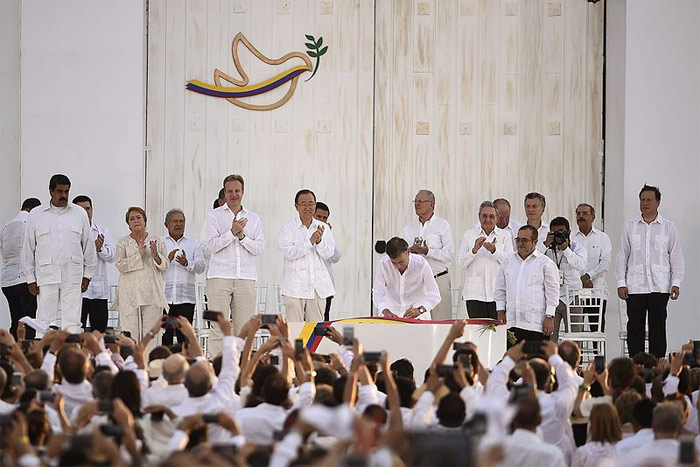Colombians voted Sunday in the first presidential elections since the signing of the peace accord with the FARC in 2016. The results of this first round of elections reflect a country deeply divided.
Presidential candidate Ivan Duque, close ally of the conservative former president and staunch critic of the peace accord Alvaro Uribe, received 39% of the vote, while Gustavo Petro, the leftist former mayor of Bogotá who says he wants to protect the peace accord, received 25%. A third candidate, the more moderate Sergio Fajardo, came in at 23%.
Since no candidate received a majority of the vote, a second round will take place on 17 June between Duque and Petro. There is concern that the country’s severe polarization will result in a bitterly contested campaign. This could lead to heightened tension, particularly in the rural districts. It remains unclear who Fajardo’s voters will support.
Peace may slip away
One and a half years since the signing of the peace accord, the implementation is not going well. Peace may be slipping away. This is largely due to President Juan Manuel Santos’s government dragging its heels in implementing the peace programme. Former FARC militants are only receiving piecemeal help in establishing themselves in post-conflict society; police and special forces are unable to protect residents in regions where fighting occurred against new armed groups or mafias involved in the drug trade or illegal gold mining; and a small but growing number of former FARC militias are refusing to lay down their arms.
For instance, in the Cauca Department in the southwest, no less than eight armed groups have replaced the demobilized FARC, and in the Meta Department in the east a dissident FARC group drove dozens of residents from their land. Across the country, leaders of social organizations have been threatened and even murdered.
Still much to do
The peace accord signed in 2016 remains an enormous step forward. But the government is simply not there in large areas of the country, resulting in extreme inequality, poverty and insecurity. To bring meaningful change, more thorough reforms such as those agreed in the peace accord must be implemented. But to date the country’s political elite has shown little interest in doing so. Agreements to allow poor farmers access to land, or putting victims at the forefront of truth-finding and justice, are not being honoured. For instance, the bureau for finding people gone missing during the conflict still has no staff or resources.
“Don’t abandon us”
Peace in Colombia will only be achieved when the implementation of the peace accord is taken up ambitiously. Leaders of organizations representing victims, supported by PAX, conducted an online campaign to let the presidential candidates know: “Whoever wins, don’t abandon us. Implement the peace accord, don’t let peace slip away.”
See also Reintegrating former combatants in Colombia
And One year later, Colombia peace accord failing




